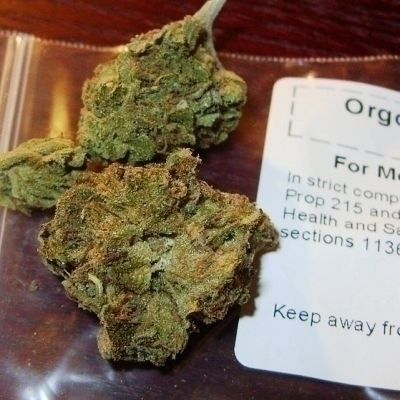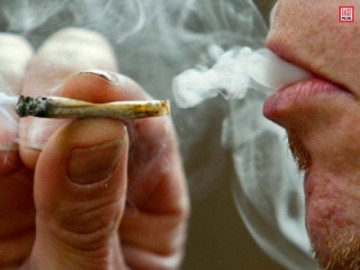Jared Moffat: Now is the Right Time for RI to Regulate Marijuana
Monday, February 03, 2014
In recent years the movement to legalize and regulate marijuana has taken off in Rhode Island. Since at least 2012, polls have consistently shown that a clear majority of Rhode Islanders supports ending marijuana prohibition. With each legislative session, the coalition of lawmakers who would rather see marijuana taxed and regulated grows in both parties.
Realizing that rising support for marijuana legalization is becoming an unstoppable force, opponents of reform are now making one last ditch attempt to stave off the inevitable, pleading “let’s wait a little longer.” With more and more people realizing that marijuana prohibition simply does not work, supporters of the status quo are trying to appeal to our fear of the unknown, saying, “But we don’t know what happens when you legalize marijuana. Let’s wait and see.”
Prohibition has not worked
GET THE LATEST BREAKING NEWS HERE -- SIGN UP FOR GOLOCAL FREE DAILY EBLASTWe do not need to wait any longer. We have been waiting more than 90 years for marijuana prohibition to work in Rhode Island, and we have seen that it does not. Making marijuana illegal has not deterred use or reduced supply. It has, however, distracted law enforcement resources from serious crime, disproportionately funneled thousands of people, mostly young men of color, into the criminal justice system, and profited criminal organizations by creating a lucrative illegal market. Allowing marijuana prohibition to continue, when we know it has proven to be a destructive and wasteful policy, would be foolish. This 2014 legislative session is the perfect time for Rhode Island to end the failed policy of prohibition and regulate marijuana like alcohol with a system of licenses, taxes, and age restrictions.
The abysmal track record of marijuana prohibition alone is enough to motivate us to take a new approach. But another problem with the “wait and see” objection is that we already are seeing what happens when you end prohibition and regulate marijuana responsibly. More than a year after Washington and Colorado legalized marijuana for adults, the sky has not fallen as anti-legalization activists claimed it would.
While opponents said that regulating marijuana like alcohol would “send the wrong message to teenagers”, teens are apparently not listening. Though the marijuana issue received a great deal of attention during 2013, national marijuana usage rates among teenagers remained flat compared to 2011 and 2012 ( Monitoring the Future data, 2013). As the first state to allow legal sales of marijuana to adults, the only changes Colorado has seen are a lot fewer arrests for marijuana crimes, huge tax revenue increases, and an explosion of new businesses and middle class jobs.
Federal interference no longer an issue
For states considering marijuana legalization, interference from the federal government is no longer a concern. In August of last year, the Department of Justice gave a qualified green light for Colorado, Washington, and other states to proceed with implementing the will of their voters to regulate marijuana like alcohol. In a recent interview with The New Yorker, President Obama said, “It’s important for [marijuana legalization] to go forward”. And in another important move, Attorney General Eric Holder has announced plans to restructure federal statutes to allow legal marijuana businesses to access crucial banking services.
Most politicos and pundits agree that marijuana legalization on a national scale is inevitable. Early adopter states like Colorado and Washington will enjoy a significant economic advantage over latecomers. Marijuana businesses and entrepreneurs will naturally look to headquarter their operations in the states that legalize marijuana first, giving those states a much larger piece of the soon-to-be-legal $100 billion dollar marijuana industry.
An economic opportunity for Rhode Island
This legislative session, lawmakers have an opportunity to make Rhode Island the first state on the East Coast to legalize and regulate marijuana. If we do, Rhode Island businesses will have a significant head start advantage in the regional economy when states like Massachusetts and Connecticut legalize marijuana later on. Rhode Island businesses will expand into neighboring states, rather than the reverse.
Last year Rhode Island decriminalized possession of small amounts of marijuana, because the vast majority of Rhode Islanders believes that marijuana users should not be labeled as criminals. If we agree that users are not criminals, why are we forcing them to buy marijuana from criminals in an illegal market? Why would we allow those sales to go unregulated and untaxed?
It does not take a lot of creativity to imagine what legalization look like in Rhode Island. Our medical marijuana dispensaries already provide a practical example of how legal marijuana businesses would operate.
Two things are clear: marijuana prohibition is coming to an end and Rhode Island needs to find revenue now. Rhode Island faces a $150 million budget shortfall, and Governor Chafee has proposed $43 million in cuts to Medicaid. Waiting will simply delay the collection of tens of millions of dollars in revenue that Rhode Island needs now. It makes sense for Rhode Island to legalize marijuana this year.
Jared Moffat is the director of Regulate Rhode Island (www.RegulateRI.com), a broad-based coalition of citizens and organizations dedicated to ending marijuana prohibition in the Ocean State. A recent graduate from Brown University, Jared has been working to reform Rhode Island's drug laws for five years and hopes to pursue a career in public policy.
Related Slideshow: Marijuana Use in the New England States
According to data collected by the Substance Abuse & Mental Health Services Administration, New Englanders are among the nation's top marijuana users in the country. See how the indivdual states compare in the slides below:










